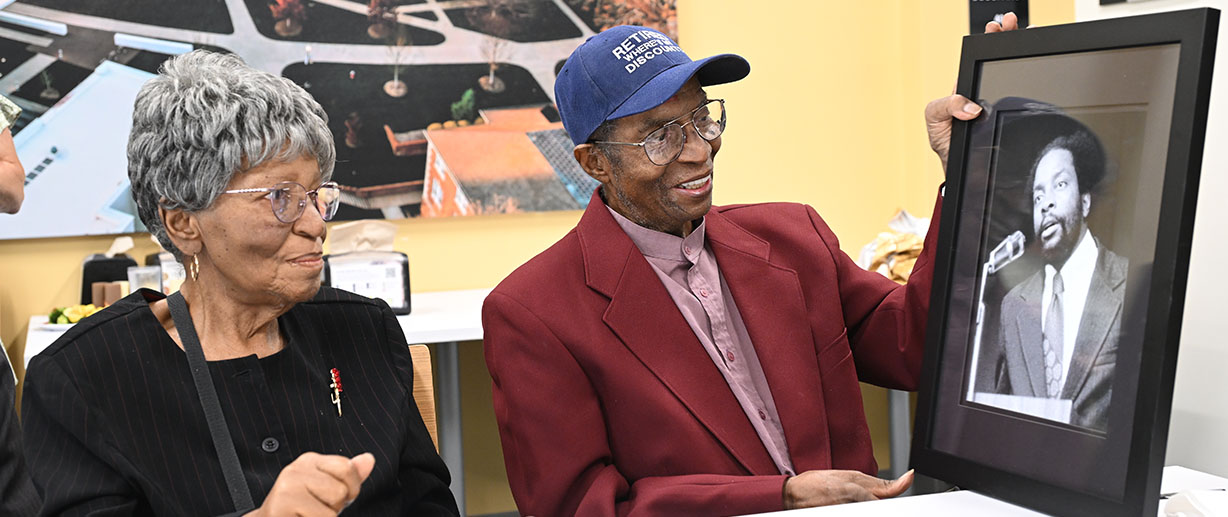The Rev. Dr. Otis Turner arrived on Wofford College’s campus in 1972 as the college’s first Black faculty member, but he never quite knew the impact he had during his five years at the college until this week.
Turner, a former assistant professor of religion, returned to campus with his wife, Patsy. He was interviewed by student researchers about his life and place in the college’s history, received a tour of the campus, met administrators and faculty and was reunited with three former students.
“At the time when Dr. Turner came in, imagine a pond and a rock is tossed in and ripples come about,” says Bob Reeder ’74, who was one Turner’s students.
During a lunch in his honor, Turner was presented with a photo of himself from the college’s archives that will hang in the faculty dining room. The college’s Office of Equity, Diversity and Inclusion also announced that its annual faculty and staff diversity and inclusion award will be renamed in his honor.
Recognition from the college and hearing stories from former students made him aware of the impact he had while at Wofford.
“I did not realize it until I came back on this trip,” says Turner, who was visiting Wofford for the first time since he left. “It’s mind boggling. I had no idea.”
Reeder was among the first Black students on campus in the early 1970s. He remembers Black students feeling as though they were in a rainstorm while desegregating the campus, but Turner and Bobby Leach, the college’s first Black administrator, provided relief.
“They were like umbrellas to Black students,” Reeder says. “We weren’t even aware how much they were helping us.”
James Cheek ’73 didn’t take any of Turner’s classes, but he was watching him and learning.
“While I was not a student of Dr. Turner’s in his class, I was a student of his in the sense of watching him and how he carried himself,” Cheek says. “As students, we honestly and firmly believed what he did was an example of what we could do and accomplish.”
The Rev. Dr. Ron Robinson ’78, Perkins-Prothro Chaplain and Professor of Religion, took Turner’s Black Theology and Ethics course.
“It changed my life,” Robinson says. “He introduced me to a lot of theologians that I later got to meet and work with that profoundly influenced my thinking.”
Turner was exposed to the Civil Rights Movement during his youth. While he supported Dr. Martin Luther King Jr.’s work, he didn’t march alongside him as an undergraduate at Albany State College because that could have meant trouble. About 40 Albany State students were expelled from the college in 1961 for participating in civil rights demonstrations.
Instead, Turner participated in the movement by attending demonstrations with his camera in hand to blend in with the press while documenting events. He later was able to meet King and his family as well as Stokely Carmichael.
Turner was the first Black student to study at Emory University’s Candler School of Theology. His dissertation, “Toward an Ethic of Black Liberation Based on the Philosophy of Martin Luther King Jr. and Stokely Carmichael's Concept of Black Power,” was Candler’s first to explore Black theology and ethics. Candler recognized Turner’s contributions with its Ducree-Turner scholarship, which is awarded to students pursuing a calling to serve in historically Black denominational traditions.
Robinson read King’s “A Letter from a Birmingham Jail” in Turner’s class, and he eventually served as a summer driver for two of the ministers to whom King addressed the letter.
“I teach Dr. King’s letter and have students read it out loud in the building where (Turner) taught me,” says Robinson, who teaches in Main Building.
After leaving Wofford, Turner spent a year as an administrator at the South Carolina School for the Deaf and the Blind. Then, he spent 10 years as the director of the Council on Church and Race for the Presbyterian Church based in Atlanta, Georgia, before later serving as the coordinator for racial justice policy development and the administrator of the Fund for Legal Aid in the Racial Ethnic Ministry Unit of the Presbyterian Church.
Turner is retired and lives in Jacksonville, Florida.
He leaned on lessons from his mother when he studied and worked in spaces where he met institutional resistance because of the topics he wanted to explore and the courses he wanted to teach.
“My mother taught me early on that when you see something important to you, failure is not an option,” Turner says.
That approach resonated with Dani Emmen ’26, a sociology and anthropology major from Conway, South Carolina. Emmen was one of five student researchers who interviewed Turner as part of a research project funded by a Network for Vocation in Undergraduate Education (NetVUE) grant from the Council of Independent Colleges. Supported by the Lily Endowment, Net VUE grants assist colleges and universities with reframing their institutional histories and missions based on today’s context.
“I feel like I’m going to adopt his motto of failure not being an option,” Emmen says. “It really shows me that when I graduate, I have a chance. If it wasn’t for them and all they went through I wouldn’t be here.”
